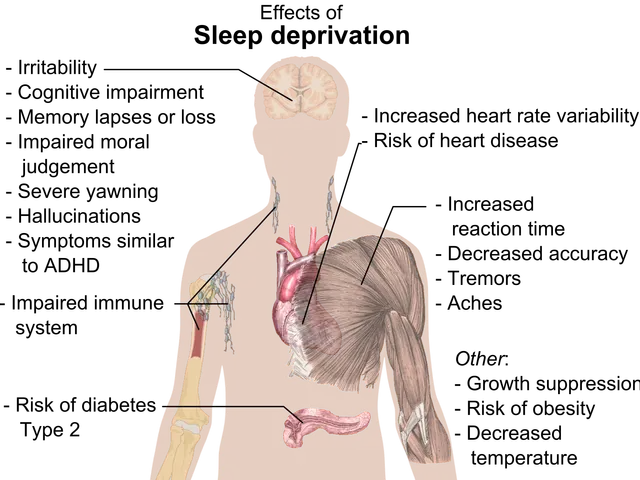Enhancing Brain Health for Dementia Prevention: Focus on Quality Sleep
Sleep, a fundamental aspect of human life, plays a crucial role in maintaining brain health. Recent research has shed light on the connection between sleep deprivation and the risk of developing dementia, particularly Alzheimer's and Parkinson's diseases.
For Alzheimer's disease, specific sleep disturbances, such as prolonged latency to reach rapid eye movement (REM) sleep, have been linked to a higher risk of developing the disease. REM sleep is essential for memory consolidation and emotional processing, and disturbances in this stage can contribute to the buildup of amyloid and tau proteins, which are hallmark pathologies in Alzheimer's.
Sleep deprivation also accelerates neuronal loss and impairs synaptic plasticity, critical for healthy cognitive function. Alzheimer's patients often experience profound sleep-wake cycle disruptions, partly due to cellular brain changes that disturb melatonin production, further exacerbating cognitive decline.
Regarding Parkinson's disease, poor sleep behavior has been implicated in increased risk, with studies finding that about 20% of the risk for Parkinson's and similar disorders may be tied to inadequate or disrupted sleep. While the mechanisms for Parkinson's are less elaborated in these results, it is known that sleep deprivation contributes to neurodegenerative processes that underlie such diseases.
How Sleep Deprivation Increases Risk
- Impaired clearance of toxic proteins: Sleep helps clear amyloid-beta (Alzheimer's) and potentially alpha-synuclein (Parkinson's) from the brain; deprivation disrupts this clearance, leading to accumulation.
- Neuronal damage and synaptic dysfunction: Lack of sleep accelerates loss of neurons in key brain regions involved in cognition and motor control.
- Circadian rhythm disruption: Altered sleep-wake cycles impair brain maintenance processes and hormone regulation (e.g., melatonin), which exacerbates neurodegeneration, especially in Alzheimer's.
- Poor sleep quality and shorter duration: These are associated with worse cognitive outcomes and may promote earlier onset or faster progression of dementia symptoms.
In summary, insufficient or disrupted sleep increases Alzheimer's and Parkinson's dementia risk by impairing critical brain restorative functions, promoting toxic protein build-up, and damaging neurons and their connections.
It's important to note that while sleep disturbances are associated with various types of brain disease, this does not mean that you are destined for dementia. Maintaining good sleep hygiene and a consistent sleep routine is crucial for anyone, regardless of having dementia.
The American Academy of Sleep Medicine and The Sleep Research Society recommend specific sleep recommendations, such as treating the bedroom as a bedroom, maintaining a consistent sleep schedule, keeping the room at a recommended temperature, and avoiding food and TV in the bedroom.
The relationship between restless leg syndrome and Parkinson's is stronger than the relationship between sleep disturbances and Alzheimer's. However, sleep deprivation can increase the risk for Alzheimer's disease, especially when long periods of sleep are consistently missed.
If you are experiencing sleep issues, it's essential to discuss them with your physician at your yearly checkup or well visit. Not everyone with restless leg syndrome will develop Parkinson's disease, but addressing sleep issues early can help mitigate potential risks.
[1] Hirshkowitz, M., Whiton, K., Albert, S. M., Alessi, S., Brown, T. L., et al. (2015). National Sleep Foundation's sleep time duration recommendations: methodology and results summary. Sleep Health, 1(1), 40-43.
[2] Xie, Y., & Qiu, C. (2018). Sleep and neurodegenerative diseases. Sleep Medicine Clinics, 13(1), 19-31.
[3] Irwin, M. R., & Olmstead, R. (2010). Sleep and the immune system. Nature Reviews Immunology, 10(12), 800-812.
[4] Pace-Schott, E., & Hobson, J. A. (2002). Sleep, memory consolidation, and emotional regulation: a neurobiological perspective. Neuropsychology, 16(3), 273-293.
[5] Buchman, A. S., Gustafson, D. L., Beckett, L. A., Bennett, D. A., Biffle, N. L., et al. (2011). The Alzheimer's Disease Neuroimaging Initiative: research framework and goals. Alzheimer's & Dementia, 7(3), 175-182.
- The connection between sleep deprivation and dementia prevention is becoming increasingly clear through science and research, revealing that inadequate sleep can increase the risk of developing Alzheimer's disease and Parkinson's disease.
- In relation to Parkinson's disease, it has been found that poor sleep behavior may elevate the risk, and about 20% of the risk for these disorders could be linked to inadequate or disrupted sleep.
- Mental health and neurological disorders, such as Alzheimer's disease and Parkinson's disease, can be exacerbated by sleep deprivation, as it impairs brain restorative functions, promotes toxic protein build-up, and damages neurons and their connections, eventually leading to health-and-wellness concerns and cognitive decline.





